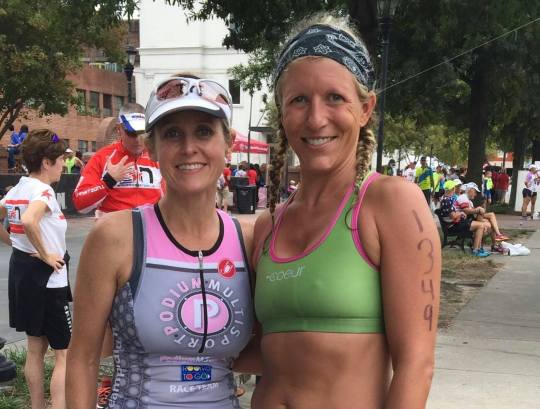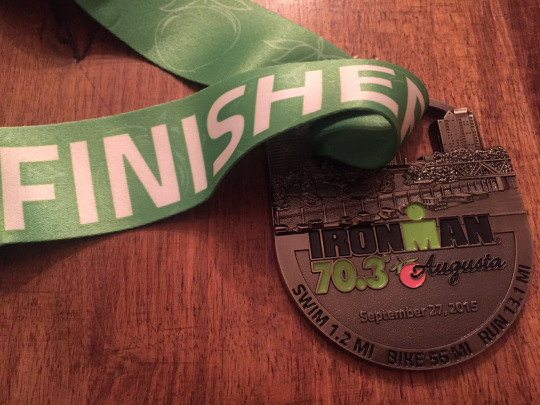By Sheila Howard
Editor’s Note” this is the second part of a 2 part blog by Sheila. You can read part 1 here.
TO DNF OR NOT TO DNF. THAT IS SOMETIMES A DIFFICULT QUESTION AND TORTUROUS DECISION TO MAKE DURING A RACE.
I didn’t have a solid swim. My bike time was what I thought it would be. I would need to have a solid run and match my best recent training runs to even finish close to where I wanted to be. Soon after I started on the run, I realized the tendon injury in my left foot was more painful than I’d imagined it would be at that point. I tried not to panic, but at only a mile and change into the run, the foot wasn’t improving, and I didn’t know what to expect.
After about another mile or so of running and the pain not getting better, my thoughts wandered to a DNF. I tried to ignore them and kept moving forward. I was in an odd bargaining arrangement between my mind and foot, hoping my foot would let me keep running long enough to reach a decision, as my mind was rejecting the DNF idea. I didn’t know whether to try to toughen up and continue or to face
reality and call it a day. How would I feel the next day about either decision? What would my coach say? Was I making my foot worse now?
Everyone around me was running, and supporters ringing cowbells and cheering athletes along. I was in a race, after all. We say it all the time and don’t really mean it, but this time I did – “My goal is just to finish.”
In a weak moment, I decided to DNF. Yet, within only a minute or two, I heard my name behind me. I recognized the voice from a phone call the night before. I turned to see an athlete with a big smile on her face. Though we’d never met, my coach told me to try to connect with an athlete of hers from Michigan who’d also be racing. We’d tried but couldn’t connect before the race. Turns out, she’d been in a bad bike crash, and had been battling back from serious injuries. My coach told me she’d signed up for Augusta, traveled alone to the race and didn’t know anyone there. I had a bad bike crash in 2012 and have a soft spot for any athlete who’s been through that and has come back to racing. Her crash and injuries were more extensive than mine, and my coach told me she was a strong athlete, though, at this point in her recovery, Augusta could be painful for her.
She immediately told me she was hurting, and needed to walk a good bit of the run, though she had a goal time and was doing the math out loud. At this point we had more than nine miles to go. For me, the thought of walking nine miles seemed as impossible and unpleasant as running them. Her run form looked to be holding together better than mine, I noted.
Me: “I’m not your coach, but I know her pretty well. I think she’d ask how much pain you’re in on a scale of 1 to 10 when you run?”
Her answer was about a four or five. I was putting mine at a six.
Me: “So, I think the boss (our coach) would say to try and run at a slow pace, and see how it goes. When either of us get to a seven or eight, let’s regroup and walk.”
Her unexpected and timely intervention was the beginning of the end of my plan to DNF! I was on a mission to help her break her goal time, and we were both determined to reach the finish line for one another as soon as possible, running, walking or anything in between.

Sheila with her new friend. They helped each other and finished together.
I’m not going to lie. Those nine miles were painful, and I mentally questioned my decision more than once. We kept moving, kept an eye out for each other, propped each other up with war stories and words of encouragement, water, gels, walking when either of us needed to and pressed on finally to that glorious
finish line. My new friend beat her goal time by almost a full hour, I dodged a DNF and we both got the medal and checked the proverbial box!
Swimming, biking and running are a brilliant combination that make for a sport with unending physical and mental challenge. Become great at it, and you’ll find yourself standing on podiums, winning awards and maybe even racing a world championship in the lava fields at Kona. But, for most of us who love and
compete in triathlon, it’s the inspiring people we encounter, those who cheer and support us, the friends we train and race with and the memories we collect on our journeys to each finish line – these become our most enduring prizes of all!

Some finishes mean more than others.


 SWIM
SWIM
 BIKES
BIKES
 APPAREL
APPAREL
 NUTRITION
NUTRITION
 COMPONENTS
COMPONENTS
 ACCESSORIES
ACCESSORIES
 Podium Multisports Blog
Podium Multisports Blog









